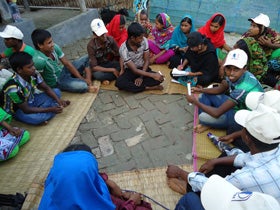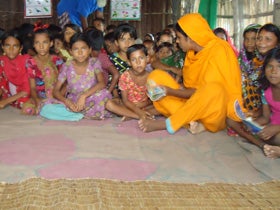 Our journey to the remote region of Gabura in Bangladesh took us down unpaved roads, through meandering rivers and to the edges of the Sundarban mangrove forest. The first thing that struck us was the near absence of trees in the village. During cyclones Sidr and Aila, saline water had destroyed agricultural land and although the place was surrounded by water, it was unfit to drink. The embankment, which was built to protect the area from tidal surges, was in severe disrepair. To make matters worse, once the aid funds had dried up in the aftermath of the cyclones, almost all the NGOs had left and there was little assistance coming from the government.
Our journey to the remote region of Gabura in Bangladesh took us down unpaved roads, through meandering rivers and to the edges of the Sundarban mangrove forest. The first thing that struck us was the near absence of trees in the village. During cyclones Sidr and Aila, saline water had destroyed agricultural land and although the place was surrounded by water, it was unfit to drink. The embankment, which was built to protect the area from tidal surges, was in severe disrepair. To make matters worse, once the aid funds had dried up in the aftermath of the cyclones, almost all the NGOs had left and there was little assistance coming from the government.
After receiving human rights and organizational training from Brotee, the young Barefoot Researchers devised interventions to curb child marriage in their community and started running volunteer schools for out-of-school children.
“When I was in Class 8, my parents wanted me to get married. It was difficult but I managed to call off the wedding. Now that I work with the Barefoot Researchers, I don’t want any fathers like mine to try to marry off their daughters at a young age.” These are the words of Rexona, who went from being a child bride to a Barefoot Researcher.
 In just four years, the Barefoot Researchers have worked on a wide range or interventions. They have mobilized the community to address the acute shortage of drinking water by digging reservoirs, where rain water can be collected and purified. They have raised awareness about reforestation. Brotee and the Barefoot Researchers have also undertaken several small-scale economic empowerment initiatives. They are running village savings groups, giving low interest loans to the ultra-poor and providing livelihood and financial literacy training to villagers.
In just four years, the Barefoot Researchers have worked on a wide range or interventions. They have mobilized the community to address the acute shortage of drinking water by digging reservoirs, where rain water can be collected and purified. They have raised awareness about reforestation. Brotee and the Barefoot Researchers have also undertaken several small-scale economic empowerment initiatives. They are running village savings groups, giving low interest loans to the ultra-poor and providing livelihood and financial literacy training to villagers.
By harnessing the power of young volunteers, Brotee has helped the community to overcome many difficult development challenges in a short time and with very limited resources. Sharmeen Murshid, the Head of Brotee, states, “There is no donor-beneficiary relationship here. We see the Barefoot Researchers as co-workers in development. They are making use of our knowledge. We are benefiting from their skills and so is the community.”
Barefoot Researchers
The authors partnered with Brotee for the South Asia Emerging Task Team Leader (TTL) competition. The goals of their winning project were to document Brotee’s innovative approach, set up a monitoring and evaluation (M&E) process to gauge their impact and provide technology training to the Barefoot Researchers.



Join the Conversation